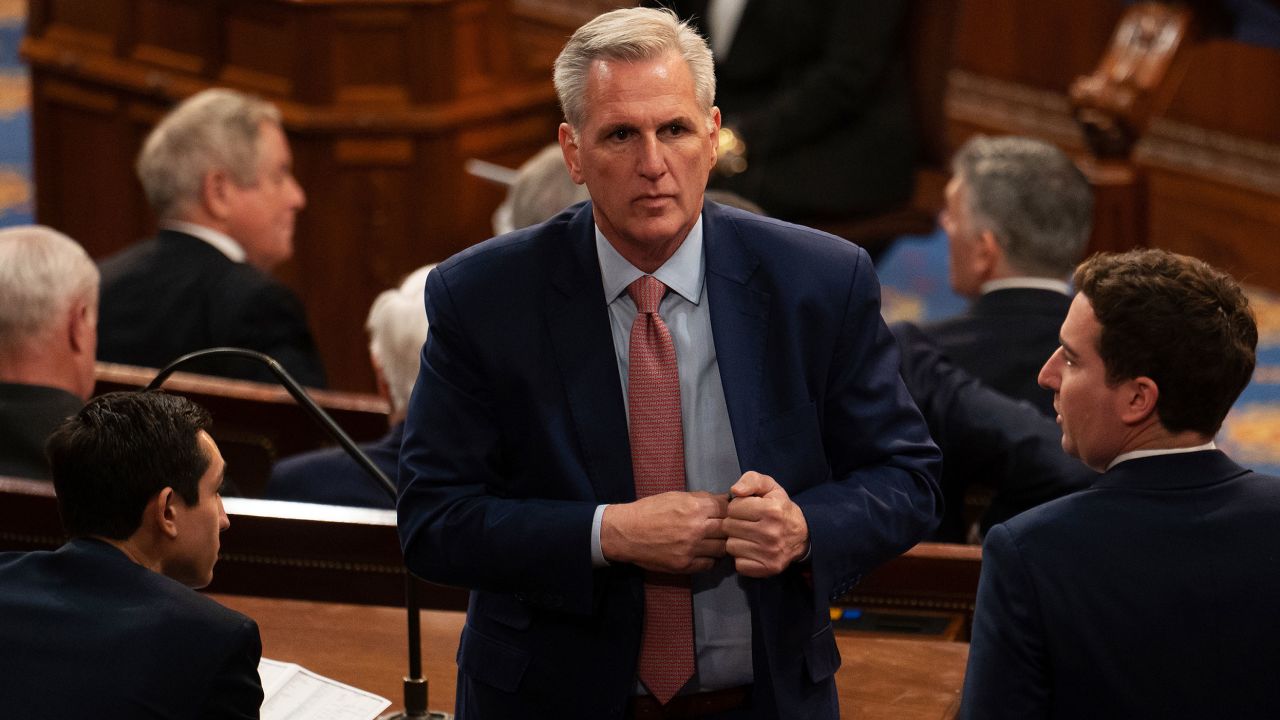(Trends Wide) — Kevin McCarthy suffered a tough defeat again this Wednesday by losing the sixth round of voting to choose the speaker of the House of Representatives, a strong blow that further risks his candidacy for the position and increases the uncertainty about whether he will still be able to achieve it or if a viable candidate will emerge as an alternative.
House Republicans are in a contentious stalemate over who will be the next president, amid what appears to be hardened opposition against McCarthy from a group of conservatives. The contest, which began on the first day of the 118th Congress, has thrown the House’s new Republican majority into chaos and weakened the party’s agenda.
The House of Representatives met this Wednesday at noon after carrying out three rounds of voting this Tuesday. McCarthy fell short on each of them, failing to reach the majority threshold needed to secure the presidency. The House adjourned early Tuesday afternoon after the voting series dragged on for hours with no resolution in sight.
Now, the Republicans are struggling to find a way forward. McCarthy’s allies say he is not going to give up and that he remains willing to pull this off.
The talks continued through Tuesday night, with McCarthy making calls in his office, the sources said. He also sent several emissaries ––Brian Fitzpatrick, Garret Graves, French Hill, Patrick McHenry and Guy Reschenthaler–– to help find a deal with his enemies and present their demands to the rest of the House Republican conference.
The Chamber will remain paralyzed until this deadlock is resolved. And McCarthy’s Republican allies are beginning to fear that the GOP leader in the legislature may not be able to carry out his bid for the presidency if the fight drags on much longer. Although McCarthy has the strong support of most of the conference, some are undecided to stick with him.
Rep. Ken Buck of Colorado, who voted for McCarthy, says “at some point” he’s going to have to step aside and let Steve Scalise run.
“But what I asked is if Kevin can’t make it, that he step aside and give Steve a chance to make it,” Buck told Trends Wide.
On the other hand, a member who has supported McCarthy told Trends Wide that if he can’t get the votes to be elected as Speaker of the House, there is a growing fear that he will be too weak to legislate, so it is possible that another candidate has to apply.
“He probably has another 24 hours to reach an agreement. If he can’t negotiate to reach an agreement on the presidency, it means that he will not be able to negotiate and reach 218 on any contentious issue,” the member said, referring to the votes McCarthy needs. if no member skips voting or votes ‘present’. “Maybe no one else can either, but he certainly can’t.”
The same member said that a statement made by former President Donald Trump on Wednesday morning, which reaffirmed his support for McCarthy and urged Republicans to back him, was basically a failure: while it was more helpful than if he had attacked McCarthy, it was not it was expected to change things.
Another member cautioned that, after Tuesday, it is clear that opposition to McCarthy is personal, meaning there is little he can do to turn the tide at this point.
Asked if Trump’s statement could make a difference, the person admitted he doubted it.
Uncertainty about the way forward
House Republicans have 222 seats in the new Congress, so for McCarthy to reach 218, he can only afford to lose four GOP votes. The challenge for him is that he is up against a small, but determined, group of hardline conservatives who have so far managed to deny him the votes needed to secure the deck.
The group has used its influence in the narrow Republican majority to extract concessions. McCarthy has already given in to some of his demands, such as facilitating the impeachment of the speaker of the House, but so far his efforts have not been enough.
As voting on Tuesday progressed, the situation seemed to become even more dire for McCarthy, as the number of votes against his run for president increased.
The result of the first ballot was 203 votes in favor of McCarthy, with 19 Republicans voting for other candidates. On the second ballot, the result was 203 votes for McCarthy and 19 for Republican Rep. Jim Jordan of Ohio. In the third round of voting, there were 202 votes for McCarthy and 20 votes for Jordan, with Rep. Byron Donalds joining the 19 GOP lawmakers who had voted against McCarthy in the first two rounds.
It was the first time that an election for speaker of the House had undergone multiple ballots since 1923.
“My vote yesterday was basically to break a deadlock, because we were stuck, and we weren’t getting anywhere,” Donalds, a Florida Republican, said Wednesday on Trends Wide This Morning. “Right now, (McCarthy) doesn’t have a path to get there. If that happens again, yes, I can be there, okay, but what’s needed now is for Republicans to come together and find a way to elect a president”.
In the fourth round of voting, 20 Republicans voted together for Donalds, as the group shifted their collective support from Jordan to Donalds. Rep. Victoria Spartz of Indiana voted present, lowering McCarthy’s threshold to 217.
Spartz told Trends Wide that he did so because he wanted to allow more negotiations within the conference to address the concerns of the 20 members.
(Trends Wide) — Kevin McCarthy suffered a tough defeat again this Wednesday by losing the sixth round of voting to choose the speaker of the House of Representatives, a strong blow that further risks his candidacy for the position and increases the uncertainty about whether he will still be able to achieve it or if a viable candidate will emerge as an alternative.
House Republicans are in a contentious stalemate over who will be the next president, amid what appears to be hardened opposition against McCarthy from a group of conservatives. The contest, which began on the first day of the 118th Congress, has thrown the House’s new Republican majority into chaos and weakened the party’s agenda.
The House of Representatives met this Wednesday at noon after carrying out three rounds of voting this Tuesday. McCarthy fell short on each of them, failing to reach the majority threshold needed to secure the presidency. The House adjourned early Tuesday afternoon after the voting series dragged on for hours with no resolution in sight.
Now, the Republicans are struggling to find a way forward. McCarthy’s allies say he is not going to give up and that he remains willing to pull this off.
The talks continued through Tuesday night, with McCarthy making calls in his office, the sources said. He also sent several emissaries ––Brian Fitzpatrick, Garret Graves, French Hill, Patrick McHenry and Guy Reschenthaler–– to help find a deal with his enemies and present their demands to the rest of the House Republican conference.
The Chamber will remain paralyzed until this deadlock is resolved. And McCarthy’s Republican allies are beginning to fear that the GOP leader in the legislature may not be able to carry out his bid for the presidency if the fight drags on much longer. Although McCarthy has the strong support of most of the conference, some are undecided to stick with him.
Rep. Ken Buck of Colorado, who voted for McCarthy, says “at some point” he’s going to have to step aside and let Steve Scalise run.
“But what I asked is if Kevin can’t make it, that he step aside and give Steve a chance to make it,” Buck told Trends Wide.
On the other hand, a member who has supported McCarthy told Trends Wide that if he can’t get the votes to be elected as Speaker of the House, there is a growing fear that he will be too weak to legislate, so it is possible that another candidate has to apply.
“He probably has another 24 hours to reach an agreement. If he can’t negotiate to reach an agreement on the presidency, it means that he will not be able to negotiate and reach 218 on any contentious issue,” the member said, referring to the votes McCarthy needs. if no member skips voting or votes ‘present’. “Maybe no one else can either, but he certainly can’t.”
The same member said that a statement made by former President Donald Trump on Wednesday morning, which reaffirmed his support for McCarthy and urged Republicans to back him, was basically a failure: while it was more helpful than if he had attacked McCarthy, it was not it was expected to change things.
Another member cautioned that, after Tuesday, it is clear that opposition to McCarthy is personal, meaning there is little he can do to turn the tide at this point.
Asked if Trump’s statement could make a difference, the person admitted he doubted it.
Uncertainty about the way forward
House Republicans have 222 seats in the new Congress, so for McCarthy to reach 218, he can only afford to lose four GOP votes. The challenge for him is that he is up against a small, but determined, group of hardline conservatives who have so far managed to deny him the votes needed to secure the deck.
The group has used its influence in the narrow Republican majority to extract concessions. McCarthy has already given in to some of his demands, such as facilitating the impeachment of the speaker of the House, but so far his efforts have not been enough.
As voting on Tuesday progressed, the situation seemed to become even more dire for McCarthy, as the number of votes against his run for president increased.
The result of the first ballot was 203 votes in favor of McCarthy, with 19 Republicans voting for other candidates. On the second ballot, the result was 203 votes for McCarthy and 19 for Republican Rep. Jim Jordan of Ohio. In the third round of voting, there were 202 votes for McCarthy and 20 votes for Jordan, with Rep. Byron Donalds joining the 19 GOP lawmakers who had voted against McCarthy in the first two rounds.
It was the first time that an election for speaker of the House had undergone multiple ballots since 1923.
“My vote yesterday was basically to break a deadlock, because we were stuck, and we weren’t getting anywhere,” Donalds, a Florida Republican, said Wednesday on Trends Wide This Morning. “Right now, (McCarthy) doesn’t have a path to get there. If that happens again, yes, I can be there, okay, but what’s needed now is for Republicans to come together and find a way to elect a president”.
In the fourth round of voting, 20 Republicans voted together for Donalds, as the group shifted their collective support from Jordan to Donalds. Rep. Victoria Spartz of Indiana voted present, lowering McCarthy’s threshold to 217.
Spartz told Trends Wide that he did so because he wanted to allow more negotiations within the conference to address the concerns of the 20 members.




